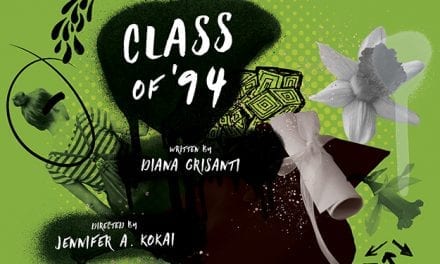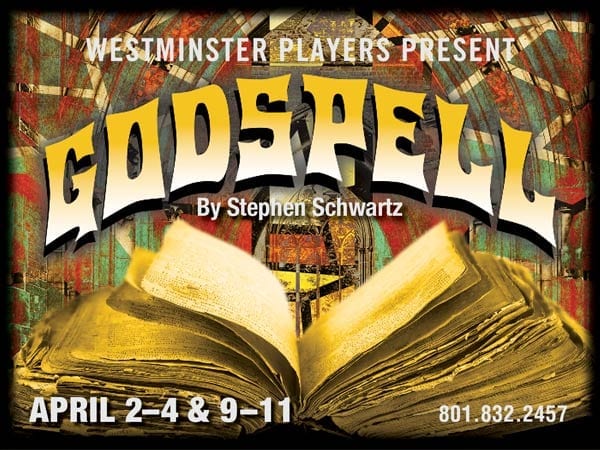
Tony Amendola as Shylock in the Utah Shakespearean Festival’s 2010 production of The Merchant of Venice. (Photo by Karl Hugh. Copyright Utah Shakespearean Festival 2010.)
CEDAR CITY — I was nervous as I entered the Adams Memorial Shakespearean Theatre for the Utah Shakespearean Festival’s production of The Merchant of Venice. Like the more lighthearted The Taming of the Shrew, The Merchant of Venice has become somewhat controversial in its portrayal of members of an oppressed group. I was also aware that sometimes Merchant is categorized as one of the Bard’s “problem plays,” because it is not a lighthearted romantic comedy (like Much Ado About Nothing) or a dark tragedy (like Macbeth), but rather lies strictly between the two in an ambiguous no man’s land.
By the end of the play, however, I did not see the work as a “problem play,” but rather Shakespeare’s attempt to give something to everybody: a courtroom drama, female-to-male crossdressing (just as much a trend in drama 400 years ago as superhero movies are today), three love stories, some comic relief, and a personal vendetta. Shakespeare certainly knew that he had a diverse audience with a wide variety of tastes to cater to!
Visually, I appreciated this show. The costumes (David Kay Mickelsen) were probably the most lavish of the Shakespearean Festival’s current productions and exemplified the prosperity and commercial might of late 16th century Venice. The set design (Troy Hemmerling) was simple, but appropriate for the text and the physical stage. Indeed, Hemmerling’s set struck that perfect balance between accentuating the text without intruding into the action of the play.
I was disappointed, however, in the direction (from Sharon Ott) in the first half of the play. Most of the first act (where Shakespeare traditionally set up the conflict that would consume the next four acts) suffered from slow pacing and static staging that seemed to drain the energy from some cast members. The pacing and energy did pick up as the performance progressed, but some scenes—such as the courtroom scene—regressed to static staging that plagued the early scenes of the plays. Ott did, however, seem to grasp inner lives of the characters (not always easy in a Shakespeare text) and competently transfer this understanding to a variety of stage business and motivations for her actors.

Chelsea Steverson (left) as Nerissa and Emily Trask as Portia in the Utah Shakespearean Festival’s 2010 production of The Merchant of Venice. (Photo by Karl Hugh. Copyright Utah Shakespearean Festival 2010.)
The actors were entrancing in their roles—especially as the play progressed. Tony Amendola’s Shylock was a rich, nuanced character (and not an anti-Semitic caricature as some critics, such as Ron Rosenbaum in his book The Shakespeare Wars, claim that Shylock is). Amendola was most poignant in the famous “If you prick us, do we not bleed?” speech, which was a momentary unique merging of performer and text that is rarely seen in the theatre. Emily Trask was a realistic Portia, who ingeniously works within the confines of her society to save the day and show her new husband Bassanio (Grant Goodman) the extent of her intelligence and abilities. Trask tackled the challenging heroine role well and her performance had me feel that Portia was often two steps ahead of the men in the play.
So, what about the anti-Semitism of the play? Well, it’s there. Ott has wisely decided to give us The Merchant of Venice, warts and all. But her understanding of Shylock and Amendola’s performance combine to create a sympathetic Shylock who is defined by his actions and not his religion or ethnicity. Indeed, this production of the play led me to see Shylock’s Jewishness as more of a foil for Antonio’s place in mainstream (Christian) Venetian culture than as a personality trait. And rarely does Shylock seem like a victim of organized persecution or institutionalized discrimination (the yellow circle on his clothing being a notable exception). Instead, he is the victim of individual acts of ugly prejudice, which to a modern audience make the Christian characters look much worse than Shylock. Ott’s Shylock—in the tradition of all of Shakespeare’s great tragic characters—is the victim of his own hubris and actions, and I commend her and her cast for striking a delicate balance between the text and modern post-Holocaust sensibilities.
But in the end, that’s what this play is about: balance. Its characters strive to balance justice and mercy, pride and humility, love and work, etc., on the scales of life (a visual image that Ott exploits in the courtroom scene). As someone striving to obtain that balance in my life, I appreciated this message.




